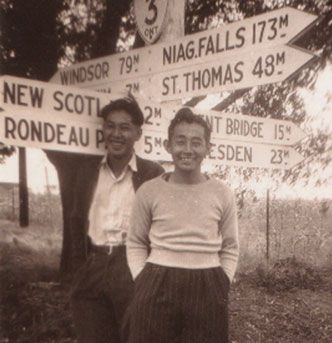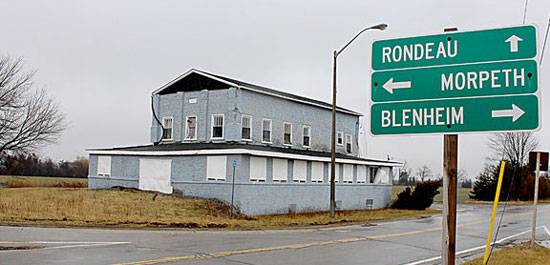
Ontario’s last remaining structure housed Japanese Canadian men
Ken Noma, Executive Director
On February 10, 2016, the Municipal Council of Chatham-Kent – in a vote of 17 to 1 – rejected the recommendation of Mr. John Taylor (Chair, Municipal Heritage Committee) and removed the Eatonville Roadhouse off its historic registry at the request of the current owner who plans to demolish it as early as this spring. The Council decision was brought to my attention by Geoffrey Nixon of CBC Windsor who referred me to an article written by Trevor Terfloth of The Chatham Daily News.
The Taylor submission to Council noted that the Eatonville Roadhouse was the last structure connected to the history of the Japanese Canadian exile to Ontario. The POW camp in Angler (Northern Ontario) is overgrown with vegetation, inaccessible and only the foundations of the buildings remain. Only one plaque in Schreiber, Ontario stands as a reminder of the Japanese Canadian exile from British Columbia that began in the spring of 1942.
On Friday, February 19th, Michiko Yano-Shuttleworth (Toronto NAJC Board Member) and I met with the current owner, Mr. Debrouwer and his son, who took us on an inspection of the Roadhouse. It was an opportunity to hear their assessment of the condition of the building. Afterwards a meeting was held with Marlee Robinson, Acting President of the Architectural Conservancy of Chatham-Kent, and John Taylor, Chair of the Municipal Heritage Committee to discuss the history of the Roadhouse; its structural integrity as well the cost of restoration and future use.

By car, the Eatonville Roadhouse is a three-hour drive west of Toronto, south of Highway 401 and is located at the corner of Talbot Trail and Kent Bridge Road in the town of Morpeth. Mr. Taylor, in his report to Council noted: “The Eatonville Roadhouse property consists of a stucco clad block two storey rectangular building with a one storey extension on three sides and built in the Art Deco style in 1926”.
The building was originally constructed as a hotel by J.A. “Pop” Eaton. In 1936, the ownership of the Roadhouse was transferred to Howard Payne. In 1942, he entered into an agreement with the Federal Government to turn his hotel into a road camp for Japanese Canadian men. From 1942-1943 it housed, 55 single Nikkei men – originally from British Columbia – who had transferred from four road camps between Schreiber and Jackfish in Northern Ontario. Northern Ontario road camps were the gateway for many Japanese Canadian exiles into the province. By June of 1942, there were 320 Nikkei men working in Chatham-Kent, Centralia and Glencoe areas of southwestern Ontario. The men at Eatonville worked under the supervision of an RCMP officer, and were paid to clear bush and timbre at Rondeau Park. By 1944, about 2,000 Nikkei had resettled from Schreiber to other parts of the province and that number had risen to 4,000 by 1945. Once the men were settled into farm work, they called for their families to join them. The Premier of Ontario, Mitch Hepburn, owned one of the larger farms in this region. Farms were located in: Harwich, Dover Centre, Dresden, Essex, Glencoe, Petrolia, Valetta and Centralia.

The building is in very poor condition. It was in use up until two years ago to house West Indian labourers who picked tomatoes for the Debouwers. It is now boarded up and shows extensive damage from vandals and animals. The cost of purchasing the land and the necessary renovations will be substantial. At the moment all options are under discussion and potential sources of funding is being investigated.
As the Roadhouse falls within the geographic boundaries of the Toronto NAJC and the Hamilton NAJC, the two organizations have been invited to take part in the negotiations. I spoke with Mayor Randy Hope of Chatham-Kent on Thursday, February 25th and I was pleased to hear that he is committed to honouring the history of Japanese Canadian exiles in his Municipality but he stated that his Council will not reconsider putting the Eatonville Roadhouse back on the historic registry. I have sent an urgent letter to Premier Wynne of Ontario who has referred the matter to the office of the Minister of Tourism, Culture and Sport. I have yet to hear from the Ministry.
Although the decision taken by the Municipal Council has cleared the way for the demolition of the Roadhouse, it has allowed us to engage in dialogue with the larger community about past injustices towards Japanese Canadians and opened discussions on how to create permanent Nikkei memorials of remembrance in this part of the province.
It is hoped that this historic building can be saved and that monies from government agencies can be found for its restoration. I will keep you posted in future issues of the Bulletin.
Contact Us
Please contact me at: k.noma@najc.ca if you know the names and have contact information of the two men in the photograph accompanying this article OR information on any member of your family who were farmworkers in Chatham-Kent area during the War.



